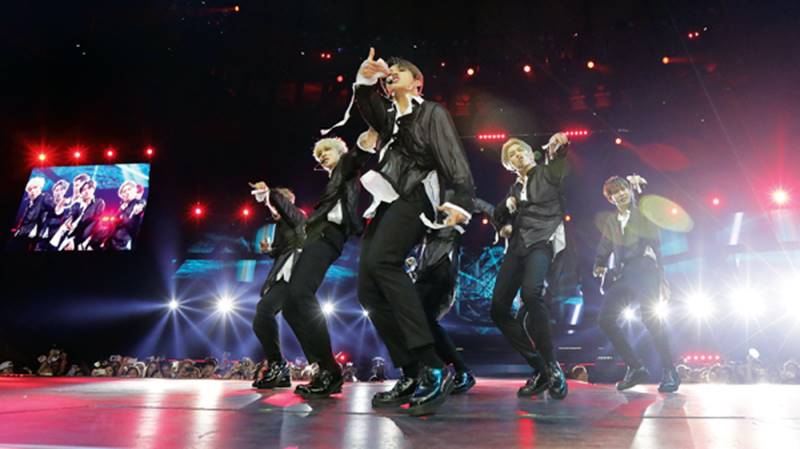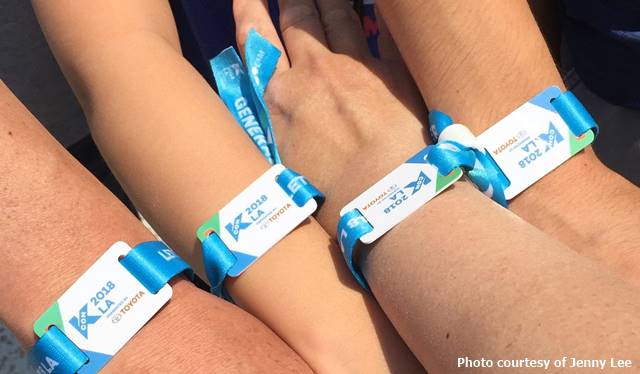
By Jae-Ha Kim
Variety (.pdf)
August 13, 2019
Created to celebrate South Korea’s soft power, KCON has grown into the Coachella of Korean culture. Debuting in 2012 as a one-day festival in Los Angeles just months after Psy’s “Gangnam Style” became a worldwide hit, KCON attracted 12,000 curious fans.
Flash forward to 2019, when one of the world’s most-famous groups is the Korean boy band BTS, Korean beauty products are all the rage, chefs are incorporating kimchi into western cooking and streaming sites including Netflix are premiering buzzworthy Korean shows such as the zombie serial “Kingdom.”
The interest in Korean culture has blown up so much that KCON has expanded into multi-day events in New York, Los Angeles, Tokyo and Bangkok.
More than 55,000 attendees were at New York’s two-day Korean culture convention last month and KCON will hit L.A. for four days, from Aug. 15-18, at the Los Angeles Convention Center and the Staples Center. Organizers are expecting more than 100,000 people to join the festivities.
“Ever since we hosted the inaugural KCON, we had this flood of requests from fans around the world to host KCON in their cities,” says Kijoo Kim, senior VP, head of KCON, at CJ ENM America, the global lifestyle brand that spearheads the annual convention. “We listen to our fans and reflect their voices and needs in everything, including lineup, programming and even new locations. K-pop is a global phenomenon.”
KCON has evolved from its earliest incarnation as a K-pop fan festival into a massive convention that is inclusive of many aspects of Korean culture. Music still remains the top attraction, with artists performing full concerts on the KCON stage. But, in addition to booths set up to highlight Korean food and skin-care products, there will be fan-club meetups and contests. Also, experts will helm workshops and panels to discuss how K-pop has been a source of mental-health strength for fans; what it takes for a K-pop act to make a comeback; and how stan culture can help propel groups to success.
According to the Korea Foundation, which tracks the growth of Korean culture, the percentage of people interested in Korean entertainment has increased steadily over the years. Its findings showed a 22% increase in the number of fans from 73 million in 2017 to more than 89 million devotees the following year. The organization attributed this jump in interest to the phenomenal success of BTS, which was a relative unknown before its KCON debut in 2014.
Boy band ATEEZ (pictured), which performed at KCON in New York last month, will take the stage Aug. 17 at the Staples Center. Though it has been just a year since the group debuted, there has been such a strong buzz about the band that it sold out its tour earlier this year and recently signed a U.S. deal with RCA Records.
“It’s important to us to be able to perform at KCON, because it’s an opportunity for us to see and meet our fans, but it’s also a great way for ATEEZ’s performances to gain even more exposure in the K-pop community,” says group leader Hongjoong. “We’re very surprised and fascinated by the interest in Korean arts and culture. But it’s also motivation for us to work even harder moving forward.”
Bandmate Yunho adds: “Because KCON is so big, I feel like it’s a great opportunity for us to grow and gain more stage experience. Although every stage is a new experience, especially with KCON stages, I feel like there’s a lot I can learn and take away.”

Tiffany Young performed at several KCON festivals with her group Girls’ Generation. For her, the concerts were a homecoming of sorts. Born and raised in California, the Korean-American left L.A. for Seoul as a teenager to pursue her dream of becoming a singer. Girls’ Generation was already a superstar group when the women performed at their first KCON in 2014. Young says it was an emotional experience for her.
“Now that I look back on it, the whole KCON concept was such a big moment for Korean Americans,” she says. “When I was growing up, I could not have imagined K-pop becoming as massive as it is right now. My bandmates were so happy for me to get to perform onstage with them in my hometown. I could see everything and everyone. I love how all ages and races are represented at K-pop shows. It’s an amazing and beautiful way to enjoy music with your family and friends.”
CJ ENM America pointed out that KCON’s diverse audience reflects the popularity of K-pop outside South Korea. Sixty percent of attendees are not Asian, with less than 5% of Korean heritage.
“We see that our audiences are growing old with KCON as it marks its eighth year with a constant flux of new fans,” Kim says. “About 30% of attendees are older than 25 years.”

Jenny Lee falls into that “older” demographic. Attending KCON has become a tradition for her family of four. Initially, they went because they were fascinated that a convention to highlight Korean culture even existed.
“Each year that I go to KCON, I am surprised by the sheer number of non-Koreans there,” Lee says. “Having been born and raised in L.A. in the early 1970s, when most people didn’t know the difference between Koreans and other Asians or even know where Korea was on a map, I can’t help but feel a sense of pride as I see so many non-Koreans enjoy and take part in an event like this. Both my husband and I are second-generation Korean-Americans. Contrary to our experiences growing up, I love that my kids are growing up in a time when most of their peers are already familiar with Korean food, culture and music, thanks to events like KCON.”
KCON ticket prices range from $80 (for one day) up to $1,800 for packages that provide fans with preferred seating and meet-and-greet opportunities with the performers. But even with sellout crowds, the festival hasn’t been successful in turning a profit every year. And the organizers say they’re OK with that.
“While we cannot reveal the numbers, it’s true that not every KCON is making a profit,” CJ ENM’s Kim says. “Since its inception, it has been about paving the way for Korean cultural content in general to continue to thrive globally, so that the industry gets bigger and everyone profits from there. As one of the leading Korean content providers and lifestyle brands, we at CJ see KCON as a way to build a community and interact with those fans. We are excited to explore more.”






One thought on “Ahead of KCON Los Angeles’ Kick-Off, a Look at Korean Pop Culture in 2019”